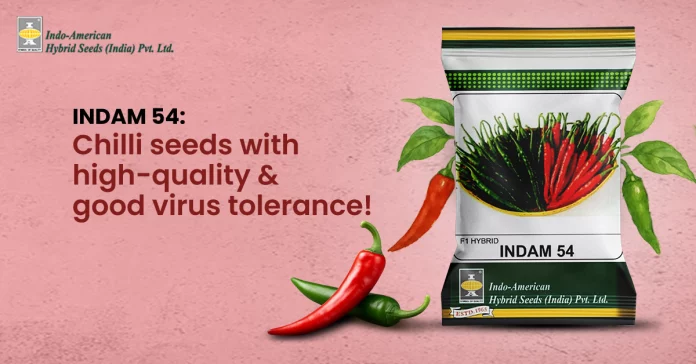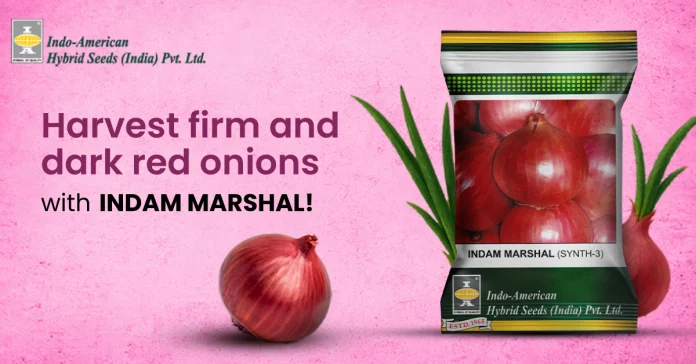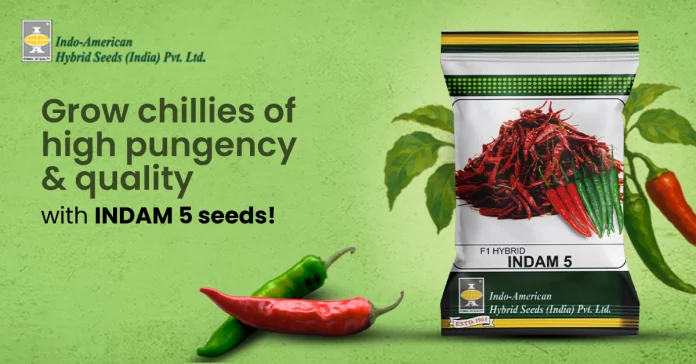India remains one of the largest global producers and consumers of chilli, cultivating a wide range of varieties to meet the demands of fresh markets, processing industries, and export trade. In response to the need for consistent yield, disease tolerance, and market-ready fruit quality, Indo-American Hybrid Seeds (INDAM) has introduced several outstanding hybrids. Among these, INDAM-6024 stands out as a high-performing chilli hybrid that is designed for long harvesting periods, high productivity, and tolerance to major diseases like Leaf Curl Virus (LCV) and Dieback.
With its bullet-shaped fruits, attractive green and red color, and robust agronomic traits, INDAM-6024 has been receiving widespread attention from chilli growers across key agricultural states like Karnataka, Maharashtra, West Bengal, and Bihar. Its suitability for both fresh green consumption and dry red chilli processing offers flexibility and higher profitability to farmers.
Overview of INDAM-6024 Chilli
INDAM-6024 is a hybrid variety developed through extensive field trials and advanced breeding techniques to offer resilience, uniformity, and high market value. This hybrid is particularly notable for its compact, erect plant structure and unique bullet-shaped fruits—traits that lend themselves well to both ease of harvest and desirable market presentation.
Its adaptability across diverse agro-climatic zones and superior resistance to common chilli diseases make it a dependable choice for farmers aiming for long-term productivity and stable income. With a planting window during the Kharif season and harvest from November to December, INDAM-6024 allows farmers to align cultivation practices with optimal climatic conditions and market demand.
Key Agronomic Features
- Plant Architecture and Growth Habit
INDAM-6024 is characterized by a strong, upright plant type that supports high fruit load without collapsing. Its semi-compact, erect stature reaches an average height of 80–100 cm, offering good air circulation and light penetration throughout the canopy.
This architecture is particularly helpful in reducing disease incidence by minimizing moisture accumulation on leaves and stems. Additionally, the robust stems and branching structure support multiple fruiting cycles, contributing to its long harvesting window.
- Fruit Characteristics
The hallmark of INDAM-6024 is its bullet-shaped fruits, which are short, thick, and exhibit an attractive shine and uniformity. These features are highly preferred by both fresh market vendors and dry chilli processors.
- Fruit Color: Initially dark green, turning to a vibrant red upon ripening.
- Length: Approximately 5.8 cm, making them ideal for compact packaging and bulk sales.
- Diameter: Around 1.7 cm, contributing to the fruit’s sturdy, meaty profile.
- Surface: Smooth with minimal wrinkling, enhancing shelf appeal and consumer preference.
- Red Dry Color: Excellent pigmentation after drying, which is a major asset for spice markets and exports.
This variety delivers high uniformity in fruit size and shape, reducing grading time post-harvest and maximizing returns from bulk buyers.
- Disease Tolerance
One of the most critical advantages of INDAM-6024 is its good tolerance to Leaf Curl Virus (LCV) and Dieback disease. These two issues significantly reduce yield and quality in traditional chilli varieties.
- LCV Resistance: Reduces the incidence of leaf distortion and stunted growth, which are common under virus pressure.
- Dieback Resistance: Maintains stem integrity and flower-to-fruit conversion even during extended harvesting periods.
With built-in resistance to these diseases, INDAM-6024 minimizes the need for frequent chemical interventions, thus reducing input costs and environmental impact.
Recommended Cultivation Practices
- Sowing and Nursery Management
- Season: Kharif
- Sowing Time: July–August
- Seed Rate: 100–110 gm/Acre
Start with a well-prepared nursery on raised beds enriched with organic matter. Ensure good drainage to avoid damping-off. Treat seeds with suitable fungicides or bioagents to prevent early-stage infections.
- Transplanting and Spacing
- Spacing: 60–75 cm between rows and 45–60 cm between plants
This spacing facilitates better canopy management and efficient use of fertilizers and water. It also helps prevent fungal infections by improving air flow.
- Soil and Irrigation
- Soil Type: Well-drained loamy to sandy loam soils with a pH of 6.5 to 7.5
- Irrigation: Drip irrigation is ideal, especially during flowering and fruit development stages. Water stress should be avoided at these critical growth periods.
- Nutrient Management
- Basal Application: Farmyard manure or compost at 8–10 tons per acre.
- Fertilizers: Apply NPK in split doses—Nitrogen for vegetative growth, Phosphorus for root and flower development, and Potassium for fruit quality and shelf life.
- Micronutrients: Supplement with Calcium, Magnesium, Boron, and Zinc to improve fruit strength and prevent physiological disorders like blossom end rot.
- Pest and Disease Management
Although INDAM-6024 shows good disease resistance, an Integrated Pest Management (IPM) approach is recommended:
- Aphids and Thrips: Monitor regularly and control using neem oil, bio-pesticides, or selective insecticides.
- Mites: Apply miticides only as needed, ensuring pre-harvest intervals are respected.
- Fungal Diseases: Preventative fungicide sprays during rainy spells and good field sanitation practices help maintain plant health.
Harvesting and Yield Potential
- Harvest Period: November to December
- Green Fruit Harvest: Starts approximately 65–70 days after transplanting
- Red Dry Fruit Harvest: Ready by 90–95 days, allowing flexibility based on market conditions
Farmers can plan staggered harvesting due to the hybrid’s long bearing ability, maximizing market opportunities and minimizing glut.
Regional Adaptability
INDAM-6024 is successfully cultivated in varied agro-climatic zones across Karnataka, Maharashtra, West Bengal, and Bihar. It has demonstrated consistent yield and fruit quality in both irrigated and rainfed conditions when managed appropriately.
Local weather, soil type, and farming practices may influence the performance slightly, but its built-in disease resistance and genetic vigor make it a reliable option across states.
Market Viability and Profitability
INDAM-6024 is suitable for dual-purpose cultivation:
- Fresh Green Markets: Thanks to its dark, shiny green fruits and compact size.
- Dry Chilli Markets: Due to its excellent red color retention, uniform drying, and pungent taste.
Its high yielding ability, combined with longer fruiting cycles and reduced disease management costs, translates to better returns on investment for commercial chilli farmers. Traders and aggregators also prefer this variety for its consistent quality, leading to stronger bargaining power for growers.
Conclusion
INDAM-6024 chilli hybrid is a well-rounded performer tailored for Indian conditions and market expectations. With strong resistance to LCV and Dieback, bullet-shaped attractive fruits, and high yield potential, it gives farmers the edge they need in a competitive market.
Its adaptability to various states, long harvesting period, and reduced pest vulnerability make it a valuable addition to the cultivation portfolio of both smallholders and commercial growers. When grown following recommended practices, INDAM-6024 has the capacity to deliver excellent returns, quality produce, and greater farmer confidence.
This hybrid represents the continued commitment of INDAM to develop crop solutions that respond to on-ground challenges and evolving market trends—making INDAM-6024 a dependable and profitable choice for the future of chilli cultivation in India.











